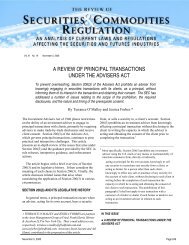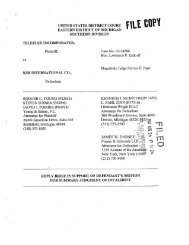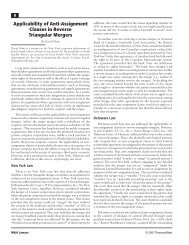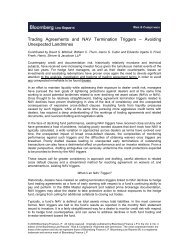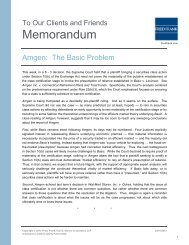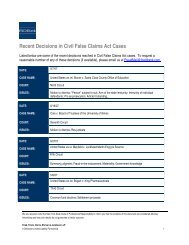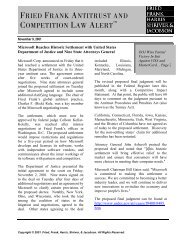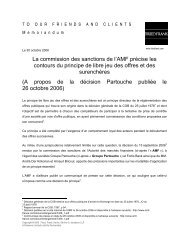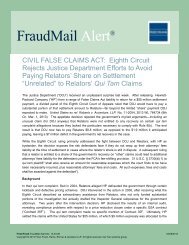Reform of French Bankruptcy Law - Fried Frank
Reform of French Bankruptcy Law - Fried Frank
Reform of French Bankruptcy Law - Fried Frank
You also want an ePaper? Increase the reach of your titles
YUMPU automatically turns print PDFs into web optimized ePapers that Google loves.
Simplified liquidation will proceed much more rapidly than a standard judicial liquidation. The liquidator is<br />
required to present a final report to the Commercial Court within one year <strong>of</strong> the opening <strong>of</strong> the liquidation,<br />
and this deadline may be extended by the court for no more than three months.<br />
6. Liability <strong>of</strong> Banks<br />
Under <strong>French</strong> law, banks lending to troubled companies face a risk <strong>of</strong> being held liable for “abusive<br />
assistance” (soutien abusif). Prior to the Act, the standard for liability was fairly broad: a bank could be<br />
held liable if it lent money to a company that it knew to be in an irredeemable position and if its financial<br />
support ultimately contributed to the debtor’s bankruptcy. The Act limits abusive assistance liability to<br />
those cases where there is fraud on the part <strong>of</strong> the bank, clear interference in the management <strong>of</strong> the<br />
debtor company, or where the security taken by the bank is disproportionate to the credit extended. 51<br />
Thus, while the remaining risk <strong>of</strong> liability is not negligible, it is more restricted.<br />
Interference in the debtor company’s management has previously been interpreted by doctrine, and<br />
through the limited case law available, to include situations where a bank has lent money to a company in<br />
difficulty simply in order to pr<strong>of</strong>it from the interest payments, when the bank knows the company will be<br />
unable to recover. It remains to be seen if bankruptcy courts will interpret the Act’s new abusive assistance<br />
provisions in a similar way.<br />
The Act provides that disproportionate security can be set aside by the court. 52 The Act does not, however,<br />
define the term “disproportionate security,” which poses a problem <strong>of</strong> interpretation. If the term<br />
“disproportionate” is interpreted by the courts to mean that the security is simply <strong>of</strong> greater value than the<br />
credit, the timing <strong>of</strong> the valuation could be critical to the determination. In any case, it is common for banks<br />
to extend credit against a lien on the business as a whole, which in most cases would necessarily exceed<br />
the amount <strong>of</strong> credit extended. 53 Under the Act, disproportionate security may be set aside regardless <strong>of</strong><br />
when the security was granted, and without a finding that the debtor has suspended payments. 54<br />
Previously, security could only be set aside if it were granted within 18 months prior to the commencement<br />
<strong>of</strong> a judicial reorganization or liquidation procedure (the “suspect period”).<br />
51 <strong>French</strong> Commercial Code, Art. L. 650-1.<br />
52 The 10-year statute <strong>of</strong> limitations will still apply, at least in theory. This period runs, not from the date on which the abusive loan is made, but from the date on<br />
which the creditor knows <strong>of</strong> the harm the loan is causing to the company. CA Paris, ch. 15 B, January 13, 2005, RG no. 200247084. This is an almost impossibly<br />
difficult standard to apply.<br />
53 <strong>French</strong> Commercial Code, Art. L. 650-1.<br />
54 Reinhard Damman, "Soutien abusif : la responsabilité des banques" [Abusive assistance: the liability <strong>of</strong> the banks], Les Echos, September 19, 2005.<br />
<strong>Fried</strong>, <strong>Frank</strong>, Harris, Shriver & Jacobson LLP Client Memorandum November 17, 2005 11<br />
A Delaware Limited Liability Partnership



